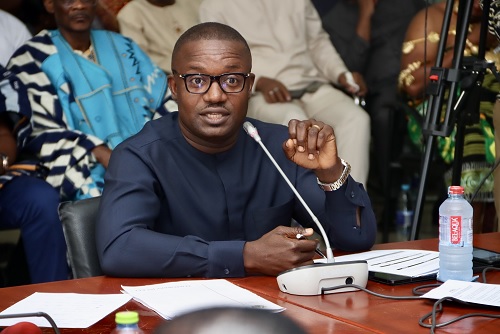Public Utility Workers Union (PUWU) has kicked against a proposed private sector participation in the mangement of the state power distribution entity, the Electricity Company of Ghana.
This resistance follows a disclosure made by Energy and Green Transition Minister-designate John Abdulai Jinapor when he appeared before parliament’s Appointment Committee to the effect that, the Mahama administration will explore the possibility of private participation in ECG with the setting up of a seven-member committee to that effect.
The Energy Minister nominee said the initiative aims to boost operational efficiency and improve power distribution across the country.
The proposed committee, which will operate independently of political influence, will comprise technical experts, legal professionals, financial analysts, industry representatives, and consumer advocates.
According to the minister designate, the proposed committee’s mandate will be to develop a comprehensive framework that aligns with international best practices, weighing options between a concession model and full privatisation.
He assured that government would eschew sole-sourcing arrangements in favor of a competitive tender process driven by clearly defined Key Performance Indicators (KPIs) and will prioritize local content participation, reflecting a balanced approach to modernizing Ghana’s power distribution sector.
The Minister-designate’s strategy represents a significant shift in ECG’s operational structure, with a focus on bringing in private sector expertise while maintaining strong public oversight. The approach aims to address long-standing efficiency challenges in the power distribution network while ensuring national interests remain protected.
Mr Jinapor noted that public buy-in would be crucial to the success of the initiative, outlining a methodical approach that would involve extensive stakeholder consultation and transparent evaluation processes before any final decisions are made regarding the extent of private sector involvement in ECG’s operations.
However, in statement dated January 13, 2025, PUWU challenged the rush toward privatization solutions, criticizing what it described as inadequately researched proposals from various interest groups.
Even though PUWU acknowledged increasing recommendations from various interest groups proposing solutions to the energy crisis, it said there is little evidence to back that claim. The union also observed the lack of stakeholder engagement behind many of these proposals, particularly those advocating for privatisation.
“We are not unaware of the numerous local and international groups seeking to invest in the power sector, especially ECG. Many of these groups have resurfaced with similar agendas despite past opposition,” the statement noted.
The union reaffirmed its long-standing position against privatizing ECG, maintaining that the existing alternative framework remains the best solution for Ghanaians and other stakeholders.
It also highlighted concerns over political interference in ECG’s management and the rising costs of inputs in the power sector, which contribute to higher electricity tariffs.
PUWU pledged to work closely with the new Mahama administration to develop sustainable strategies for ECG’s operations.
“We promise to assist through the relevant ministries in finding solutions to the challenges of ECG in a sustainable manner,” the statement concluded.
Energy debate
The country’s energy sector has once again emerged as a battleground for political sparring between the new administration and its predecessors over the state of the country’s fuel stocks for power generation, with warnings of potential widespread power outages looming ahead of a crucial pipeline maintenance period.
The controversy centers on preparations for an upcoming maintenance exercise on the West African Gas Pipeline, scheduled for January 20 to February 16, 2025.
John Jinapor, who was Co-chair of the Akufo-Addo-Mahama transition team’s sub-committee on Energy and Natural Resources, accused the outgoing administration of leaving the country with less than two days’ worth of fuel stocks.
He claimed the previous government deliberately postponed a critical pipeline maintenance project from October 2024 to January 2025 without securing the necessary alternative fuel supplies, potentially exposing the country to a power supply deficit of about 1000 MW.
Former Energy Minister, Herbert Krapa, however, refuted these allegations, asserting that the outgoing administration left adequate fuel stocks, with Cenpower currently generating power using light crude oil while AKSA continues to receive heavy fuel oil deliveries.
Krapa maintained that any potential power disruptions would stem from incompetence rather than inherited problems, challenging the new administration to “get to work” as his government did during their eight-year tenure.
$3billion debt
During his vetting, Mr Jinapor also raised concerns about the growing debt burden in Ghana’s energy sector, describing it as a critical issue requiring urgent attention.
He said the energy sector’s debt had escalated to over $3 billion as of January 12, 2025, noting that this increase compounded existing challenges, particularly the government’s financial obligations to Independent Power Producers (IPPs), which stood at $1.2 billion as of October 2024
Mr Jinapor called for pragmatic solutions to resolve the debt crisis, ensuring the sustainability of the energy sector while safeguarding Ghana’s economic stability.
“When we left office on August 31, 2017, the debt was $2.1 billion. As of yesterday, January 12, 2025, the outstanding debt has exceeded $3 billion,” Jinapor stated.
The Energy Minister-Designate attributed the mounting debt to unaccounted-for power sales, calling for immediate measures to address the issue.



